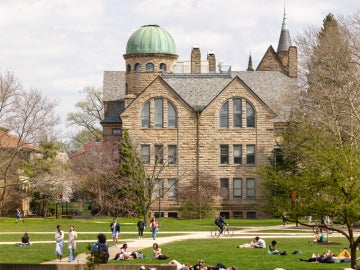Robin Beth Schaer Receives $25,000 Fellowship in Poetry from the National Endowment for the Arts
February 8, 2021
Amanda Nagy

Visiting Assistant Professor of Creative Writing Robin Beth Schaer.
Photo credit: Anthony Tognazzini
Visiting Assistant Professor of Creative Writing Robin Beth Schaer is one of 35 writers in the country who has received a $25,000 Creative Writing Fellowship for fiscal year 2021 from the National Endowment for the Arts.
This year’s National Endowment of the Arts (NEA) fellowships are in poetry and enable recipients to set aside time for writing, research, travel, and general career advancement.
Schaer is the author of the poetry collection Shipbreaking, published in 2015. Her poetry, essays, and criticism have appeared in Tin House, The Paris Review, Bomb Magazine, Orion Magazine, and Guernica, among others. She was awarded an Ohio Arts Council Individual Excellence Award in 2020.
Fellows are selected through a highly competitive, anonymous process and are judged on the basis of artistic excellence of the work sample they provided. Schaer was selected from 1,601 eligible applicants.
“A fellowship from the National Endowment for the Arts is profoundly meaningful because the publicly funded support represents the vital role of the arts in our national life,” says Schaer, who is in her second year of teaching at Oberlin. However, she explains that her plans for using the funding are complicated by the dangers of the pandemic and constraints on the availability of childcare.
“As a working artist and parent, time to write is always in short supply. I hoped the fellowship could help fund a research trip to Germany and Egypt and support childcare costs to allow me time to write. The pandemic has made both the availability of travel and childcare this summer unlikely, so I will delay those plans until it is safe to travel and enroll my child in camp or childcare.”
Schaer says she has begun a complex series of poems that braid together many elements, including the history of the color blue, the Holocaust, mysticism, Ancient Egyptian art, and a long-lost sea creature.
“The poems reckon with environmental decline, mass extinction, and mounting social crises, while making visible the strange and wondrous lines of connections between everything,” she says. “With support from the National Endowment for the Arts, I will be able to have the time and space to research, write, and hopefully complete this project over the next two years.”
Schaer has taught the Capstone Seminar in Creative Writing, Introduction to Poetry, an Advanced Poetry Workshop, and three different intermediate level poetry workshops: Surprise and Strangeness, Form and Flexibility, and Subject and Object. Next year, she will teach two new courses: a non-fiction workshop on the Lyric Essay, and a poetry workshop on Eco-Poetics and Nature Writing.
Shaer says she shares the NEA’s belief in the mutual responsibility between artists and communities to sustain one another. “My writing is driven by the conviction that contemplation is an act of compassion, and literature has the power to shape ideas, create empathy, and build a just and more humane world. Poems not only reflect the way we live, they can be agents of healing, revelation, and reckoning.”
You may also like…
Oberlin Launches Critical AI Studies Minor in Fall 2026
With a solid foundation in both science and the humanities, this minor ensures students to understand and be able to analyze the ethical, cultural, environmental, political, economic, technological, and labor effects of AI.
Chudi Martin Jr. ’24 Earns Prestigious Gates Cambridge Scholarship
Chudi Martin Jr. ’24 earns prestigious Gates Cambridge Scholarship.
Oberlin Named a Top Producer of Fulbright Students for 2025-26
Oberlin College and Conservatory was named a Top Producer of Fulbright students for the 2025-2026 academic year.


